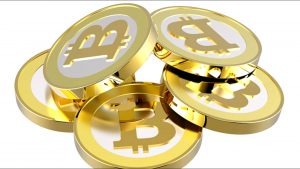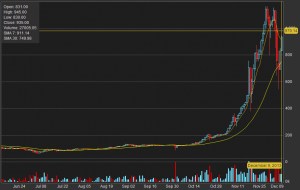
So it’s Dec 2013 and the Bitcoin market just crashed after China banned their financial institutions from participating. Baidu, a Chinese internet company removed Bitcoins or BTC as a payment method. Over the course of a few days, the price of a Bitcoin went from $1250 USD to under $600.
Everyone is screaming that this is a bubble and that it’s going to pop, but from what I can tell, there’s a bright future for this crypto or e-currency.
Of course there are risks in any investment, but the benefits (both economic and social) seriously outweigh the downside. What am I talking about? It’s called globalization, and there’s no stopping it.
Society is moving from a siloed information model to a completely open one. With the widespread adoption of the “internet” in the early 1990’s, individuals all over the world were able to communicate with each other as if they were all in the same place. Ideas on one side of the globe could be instantaneously transmitted to the other and collaboration between geographically separated teams became the norm. I participated in the growth of this through games like Multi-User Dungeons or MUDs which were the precursors to the MMORPGs of today. I remember how mind blowing it was to partner up with a friend in Finland when I lived in Hawaii, and together we were able to complete quests, trade items, and hang out as if we were neighbors. Despite all of the political posturing and religious arguments, it turns out that most global citizens actually get along. If there’s any key takeaway from these past couple internet decades, I would say that it’s the fact that we can all live in the same global society together without artificial walls and boundaries.
So what’s stopping this true globalization from taking place? I think a lot has to do with the regulation of trade and specifically currency inflows and outflows. As we all know from economics, prices are mostly set in the free markets through supply and demand. Currency, that which we use to buy, sell, save, loan, and invest, is for the most part, also regulated in this fashion. Ok, there are a ton of additional complexities such as interest rates and money supply which we will gloss over, but I can still make my point with out it. Overall, the success of the US Dollar is due to it’s perceived stability as a store of value, widespread acceptance for transactions, and liquid nature. So if the US Dollar is so great, then why do we need Bitcoins at all?
Well, although the US Dollar meets most of our globalization criteria, it’s beginning to fall short in a few areas. With the US Debt at the highest levels ever and huge shortfalls in the government run defined benefit plans such as Social Security and Medicare, the historical stability is beginning to look a little shaky. The Global acceptance of US Dollars is declining; recent shifts in US Law and policy have increased regulation and oversight and thus have created barriers on holding and using US Dollars abroad. Extreme liquidity hasn’t changed and remains the reason it is still the reserve currency of the world.

http://markets.thegenesisblock.com/
How will Bitcoins help to fill these gaps? As a store of value and stability, Bitcoin faces its toughest criticism. The price volatility is too high for anyone to allocate a significant portion of their portfolio into it at this time. As Bitcoin continues to grow in popularity and more participants join in, the volatility will naturally go down as supply and demand optimization will take place across a larger number of participants. Over time, as prices rise, speculators will take profits and sell their Bitcoins to other consumers; this will ensure a more normal distribution of Bitcoin wealth. We were able to see the start of this dissemination in the latest crash as speculators that were in the money emotionally sold off their Bitcoins during the drop. New consumers were then able to acquire more. The Global acceptance of Bitcoins as a currency is going to be it’s most powerful component. Adoption is rising steadily with new vendors announced daily, and not just in the US, but everywhere. In fact, Bitcoins are more widely accepted outside of the US at this point in time. Imagine travelling anywhere in the world and not having to worry about exchange rates or foreign cash. That is the future reality of Bitcoins. Lastly, Bitcoins are not a very liquid currency. With a total market cap estimated in the low Billions of Dollars, Bitcoin has a long way to go to get to the Trillions of US Dollars in circulation as well as all of the other global currencies. The good news here is that it’s only a matter of time as supply and demand dynamics (if current positive trends continue) should naturally increase the total value and liquidity.
So why now and not when Bitcoins were $10 or less? Actually, I was mining them back then and did a lot of research back in early 2010 when it was just starting out. Global acceptance was very much a joke at that point in time and the odds of it evolving into where it is today was very minuscule. There were too many questions about the security of it as a whole, the reaction of governments and businesses to its use, and rate of adoption. Given recent trends, investments in Bitcoin infrastructure, positive global press, and exponential price increases, the awareness and adoption of Bitcoins has, in my opinion, reached critical mass. We are at point in the evolution of this crypto /e-currency that even if an entire country tries ban its use, global citizens will still continue to use it. China will be an interesting case study given the extreme restrictions on Chinese Yuan export and conversion. I suspect that if exchanges are shutdown, a local black market will emerge where locally traded Bitcoins will be at a premium. However, it’s virtually impossible to shut down Bitcoin use and ownership as long as citizens can find a way to trade them which to me, is easier than cash at this point if you’re talking about online or overseas transactions. To completely shut it out, all P2P Bitcoin traffic must be filtered out and all physical and virtual wallets must be confiscated. This is an impossible task given the high demand for it as a product and service and adaptability of its consumers.
There you have it. Let’s all vote for a free global society by participating in Bitcoins. I’ll see you guys on the other side of this exciting adventure!

